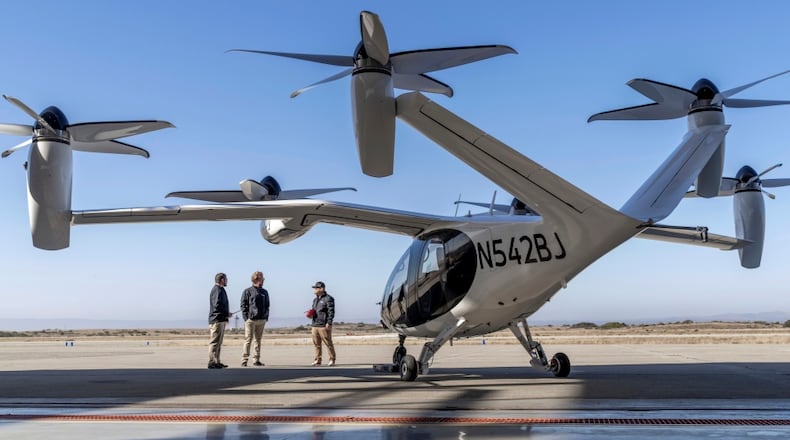Joby last year announced plans to build the first large-scale manufacturing operation of eVTOL aircraft near Dayton International Airport and in 2020 began work on an “advanced urban air mobility technology simulator” facility at Springfield-Beckley Municipal Airport. Local production of eVTOL craft will begin next year, Joby and Ohio leaders have said.
Joby intends to pursue its Global Electric Aviation Charging System (GEACS).
Archer says it will install a different rapid charging system, the Combined Charging System or CCS, a system endorsed by the General Aviation Manufacturers Association (GAMA).
That system is “being utilized by several top original equipment manufacturers (OEMs) across the industry,” Archer said in its own release Wednesday.
The system has been used by electric car manufacturers in North America and Europe, although there is a migration to the Tesla charging standard.
Joby’s announcement Wednesday with Atlantic Aviation to electrify existing aviation infrastructure in New York and Southern California paves the way for what Joby believes will be an electric air taxi service.
“Infrastructure is a critical piece of the puzzle and Atlantic’s presence in these two key U.S. markets will help ensure we’re well positioned to deliver a meaningful service for our customers,” JoeBen Bevirt, founder and chief executive of Joby Aviation, said in a release. “We’re excited to be working together to lay the foundation for the next generation of clean and quiet flight.”
Other companies are blazing a different trail when it comes to charging vehicles.
Archer and BETA were among 13 companies that signed on to a GAMA statement last September on adoption of a standard charging standard — the CCS system.
“Having one standard simplifies and improves the customer experience, and the risks and costs associated with building a network of charging stations are distributed across the industry,” GAMA said in its report.
The GAMA report called the Combined Charging Standard (CCS) “the most widely used standard in electric vehicles today.”
For its part, Joby says its system is designed to support electric aircraft and is already installed at Edwards Air Force Base and Joby’s flight testing facility in Marina, Calif.
A Joby spokeswoman Friday noted that the company developed its charging technology specifically for aviation purposes.
Joby designed the technology to support all types of electric aircraft under development today, from air taxis delivering short-range city flights to more conventional electric aircraft flying longer distances — something that is not true of the alternative concept others are proposing, Joby said in a blog post published in November.
Said Joby, “The Joby team has developed technology that builds on existing automotive charging technology standards but adapts them to the unique requirements of aviation and the urban air mobility market, unlike the repurposed automotive standard currently being discussed.”
Beta announced its own agreement with Atlantic earlier. Beta chargers are working at 17 locations nationwide, with a further 55 sites in the permitting or construction process, Flying magazine reported.
About the Author

